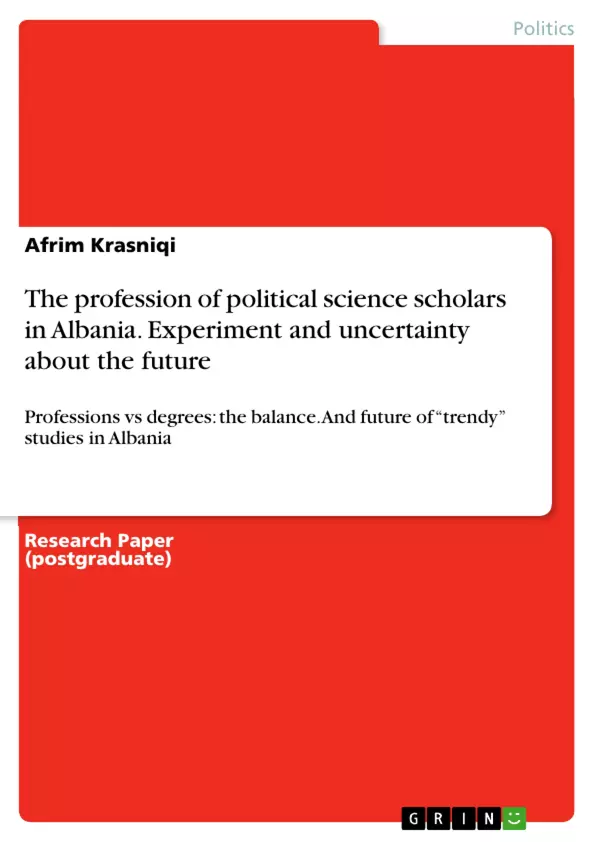This paper addresses the misbalanced rapport between the “trendy” university supply during the last decade in Albania (political science and international relations) and the real demand of the labor market. The massive stride towards these professions was made without having quality counseling information on their perspectives and employment opportunities. Public and university institutions preferred the quantity and appearance of the studies, considering the quality supply and the studies’ content as secondary. Part of this study are tests carried out on 4-5 generations of “trendy” sciences alumni, who have completed their studies and have been facing the labor market for several years. The conclusions of this test, which was carried out for the first time in Albania, constitute valuable information for the public, universities, youth and their families.
Considering the above-mentioned phenomenon as a transition phenomenon taking place in the majority of former communist countries, this study puts forward experiences and makes comparisons and concrete suggestions for the Albanian case. Its thesis supports the slogan: “professions, no diplomas”, and suggests pursuing studies in technology, information technology, natural sciences, service sector domains etc.Through the current balance and successful models applied in any other country similar to Albania, this study emphasizes the responsibility for a long-term career orientation program for the youth in making their profession choice, and a university system moving towards the long-term labor market needs in the country. It concludes by stating that this process requires an essential reformation of the public information system, an active and public partnership between university institutions and potential actors in the labor market, as well as periodic public reports that analyze the developments, expectations, suggestions and tendencies in the future decades.
Inhaltsverzeichnis (Table of Contents)
- INTRODUCTION
- Political Sciences, as a profession and misunderstanding
Zielsetzung und Themenschwerpunkte (Objectives and Key Themes)
This paper analyzes the imbalance between the increasing supply of political science and international relations degrees in Albania and the actual demand in the labor market. The study examines the consequences of this mismatch, particularly for young graduates. It explores the challenges faced by individuals who have pursued these fields and how this phenomenon has impacted Albania's higher education system.
- The rise of "trendy" studies in Albania, particularly political science and international relations.
- The lack of proper career counseling and information regarding employment prospects.
- The overproduction of graduates in these fields compared to the actual demand.
- The need for a more balanced approach to education, emphasizing practical skills and career readiness.
- The importance of collaboration between universities and the labor market to address future workforce needs.
Zusammenfassung der Kapitel (Chapter Summaries)
- INTRODUCTION: This section outlines the context for the study, highlighting the significant changes in Albania's higher education system during the transition from communism. It discusses the emergence of "trendy" studies, particularly political science and international relations, and the lack of guidance regarding career prospects in these fields.
- Political Sciences, as a profession and misunderstanding: This section explores the challenges and misconceptions surrounding the field of political science in Albania. It discusses the perception of politics as a profitable and easy career path, while emphasizing the need for a more nuanced understanding of the profession. The chapter also presents a comprehensive overview of the academic study of political science, outlining its main fields of study and its role in addressing contemporary challenges.
Schlüsselwörter (Keywords)
This research focuses on the relationship between university supply, labor market demand, and career counseling in the context of political science and international relations studies in Albania. Key concepts include: university supply, labor market, university counseling, political science, "trendy" studies, and career orientation.
Frequently Asked Questions
What is the main problem for political science graduates in Albania?
There is a significant mismatch between the high number of graduates (supply) and the actual demand for political scientists in the Albanian labor market.
Why did political science become a 'trendy' study in Albania?
Many young people perceived politics as a profitable and easy career path, leading to a massive surge in enrollments without adequate counseling on actual job prospects.
What does the slogan 'professions, no diplomas' mean in this context?
It suggests that students should focus on acquiring practical skills in high-demand fields like technology and natural sciences rather than just obtaining a general degree in 'trendy' subjects.
How can universities help address the labor market imbalance?
Universities need to form active partnerships with labor market actors and provide periodic reports on job trends and expectations to guide students effectively.
What reforms are suggested for the Albanian education system?
The study suggests a long-term career orientation program and a reform of the public information system to provide better guidance for youth making profession choices.
Is this phenomenon unique to Albania?
No, the study considers this a transition phenomenon common in many former communist countries moving towards a market economy.
- Quote paper
- PhD Afrim Krasniqi (Author), 2014, The profession of political science scholars in Albania. Experiment and uncertainty about the future, Munich, GRIN Verlag, https://www.grin.com/document/273793



